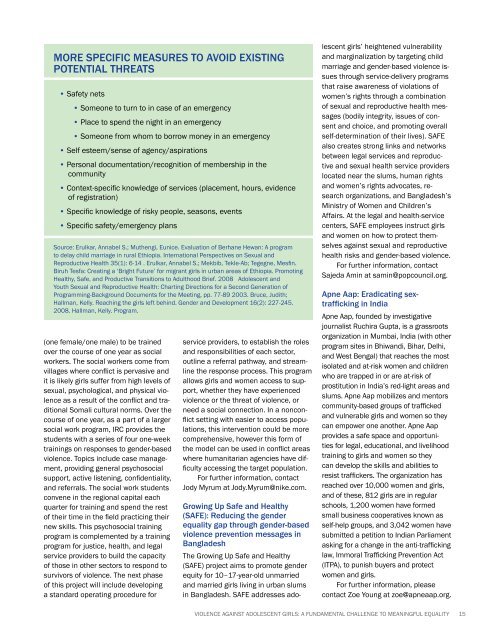2012PGY_GirlsFirst_Violence
2012PGY_GirlsFirst_Violence
2012PGY_GirlsFirst_Violence
You also want an ePaper? Increase the reach of your titles
YUMPU automatically turns print PDFs into web optimized ePapers that Google loves.
More Specific Measures to Avoid ExistingPotential Threats• Safety nets• Someone to turn to in case of an emergency• Place to spend the night in an emergency• Someone from whom to borrow money in an emergency• Self esteem/sense of agency/aspirations• Personal documentation/recognition of membership in thecommunity• Context-specific knowledge of services (placement, hours, evidenceof registration)• Specific knowledge of risky people, seasons, events• Specific safety/emergency plansSource: Erulkar, Annabel S.; Muthengi, Eunice. Evaluation of Berhane Hewan: A programto delay child marriage in rural Ethiopia. International Perspectives on Sexual andReproductive Health 35(1): 6-14 . Erulkar, Annabel S.; Mekbib, Tekle-Ab; Tegegne, Mesfin.Biruh Tesfa: Creating a ‘Bright Future’ for migrant girls in urban areas of Ethiopia. PromotingHealthy, Safe, and Productive Transitions to Adulthood Brief. 2008 Adolescent andYouth Sexual and Reproductive Health: Charting Directions for a Second Generation ofProgramming-Background Documents for the Meeting, pp. 77-89 2003. Bruce, Judith;Hallman, Kelly. Reaching the girls left behind. Gender and Development 16(2): 227-245.2008. Hallman, Kelly. Program.(one female/one male) to be trainedover the course of one year as socialworkers. The social workers come fromvillages where conflict is pervasive andit is likely girls suffer from high levels ofsexual, psychological, and physical violenceas a result of the conflict and traditionalSomali cultural norms. Over thecourse of one year, as a part of a largersocial work program, IRC provides thestudents with a series of four one-weektrainings on responses to gender-basedviolence. Topics include case management,providing general psychosocialsupport, active listening, confidentiality,and referrals. The social work studentsconvene in the regional capital eachquarter for training and spend the restof their time in the field practicing theirnew skills. This psychosocial trainingprogram is complemented by a trainingprogram for justice, health, and legalservice providers to build the capacityof those in other sectors to respond tosurvivors of violence. The next phaseof this project will include developinga standard operating procedure forservice providers, to establish the rolesand responsibilities of each sector,outline a referral pathway, and streamlinethe response process. This programallows girls and women access to support,whether they have experiencedviolence or the threat of violence, orneed a social connection. In a nonconflictsetting with easier to access populations,this intervention could be morecomprehensive, however this form ofthe model can be used in conflict areaswhere humanitarian agencies have difficultyaccessing the target population.For further information, contactJody Myrum at Jody.Myrum@nike.com.Growing Up Safe and Healthy(SAFE): Reducing the genderequality gap through gender-basedviolence prevention messages inBangladeshThe Growing Up Safe and Healthy(SAFE) project aims to promote genderequity for 10–17-year-old unmarriedand married girls living in urban slumsin Bangladesh. SAFE addresses adolescentgirls’ heightened vulnerabilityand marginalization by targeting childmarriage and gender-based violence issuesthrough service-delivery programsthat raise awareness of violations ofwomen’s rights through a combinationof sexual and reproductive health messages(bodily integrity, issues of consentand choice, and promoting overallself-determination of their lives). SAFEalso creates strong links and networksbetween legal services and reproductiveand sexual health service providerslocated near the slums, human rightsand women’s rights advocates, researchorganizations, and Bangladesh’sMinistry of Women and Children’sAffairs. At the legal and health-servicecenters, SAFE employees instruct girlsand women on how to protect themselvesagainst sexual and reproductivehealth risks and gender-based violence.For further information, contactSajeda Amin at samin@popcouncil.org.Apne Aap: Eradicating sextraffickingin IndiaApne Aap, founded by investigativejournalist Ruchira Gupta, is a grassrootsorganization in Mumbai, India (with otherprogram sites in Bhiwandi, Bihar, Delhi,and West Bengal) that reaches the mostisolated and at-risk women and childrenwho are trapped in or are at-risk ofprostitution in India’s red-light areas andslums. Apne Aap mobilizes and mentorscommunity-based groups of traffickedand vulnerable girls and women so theycan empower one another. Apne Aapprovides a safe space and opportunitiesfor legal, educational, and livelihoodtraining to girls and women so theycan develop the skills and abilities toresist traffickers. The organization hasreached over 10,000 women and girls,and of these, 812 girls are in regularschools, 1,200 women have formedsmall business cooperatives known asself-help groups, and 3,042 women havesubmitted a petition to Indian Parliamentasking for a change in the anti-traffickinglaw, Immoral Trafficking Prevention Act(ITPA), to punish buyers and protectwomen and girls.For further information, pleasecontact Zoe Young at zoe@apneaap.org.VIOLENCE AGAINST ADOLESCENT GIRLS: A FUNDAMENTAL CHALLENGE TO MEANINGFUL EQUALITY 15


